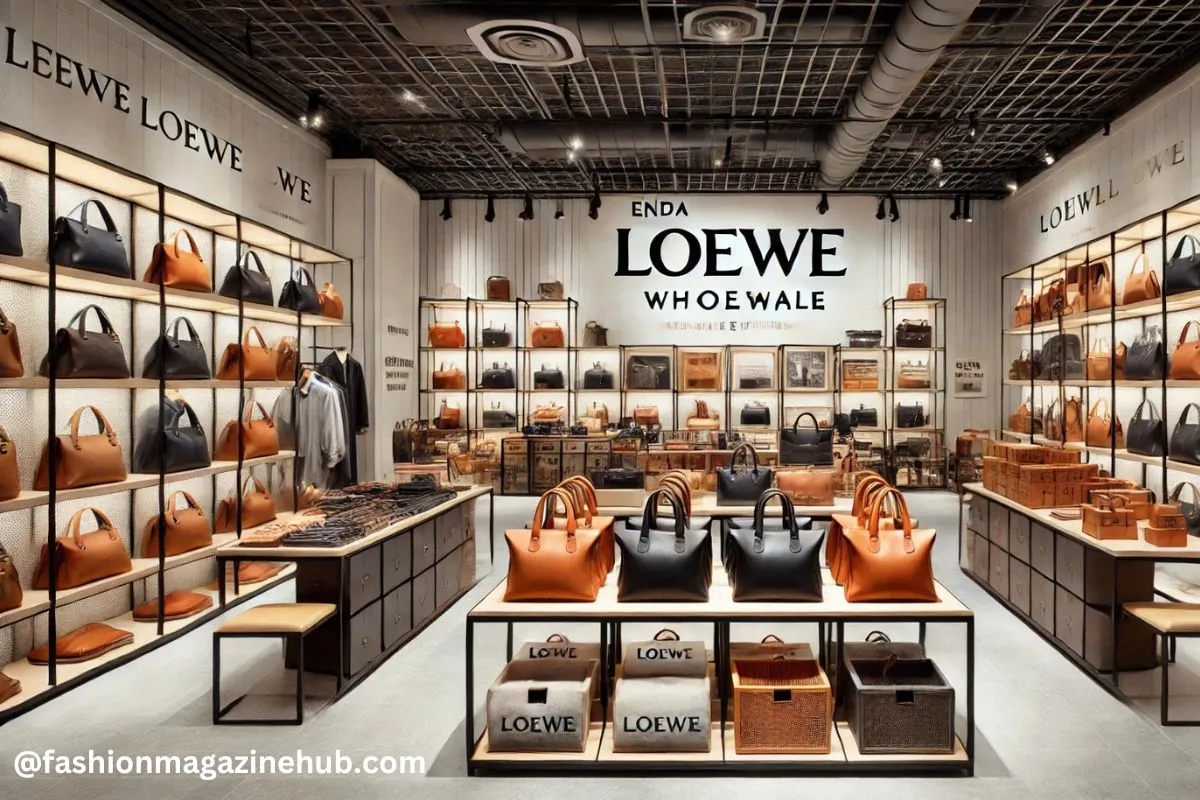Enda Wholesale Loewe: Elevating Fashion Retail With Luxury Offerings
In today’s dynamic fashion industry, the Enda Wholesale Loewe market plays a pivotal role in shaping trends and driving sales. Brands are continuously exploring innovative strategies to connect with retailers and consumers alike. Understanding the intricacies of wholesale operations is essential for maintaining a competitive edge, especially in high-end sectors.
Loewe, known for its luxury craftsmanship and distinctive designs, exemplifies how brands can successfully navigate the wholesale landscape. The company’s commitment to quality and creativity has established it as a leader in the luxury fashion market. By fostering strong relationships with retailers, Loewe can effectively expand its reach and influence.
Moreover, the integration of sustainability and technology into wholesale practices is transforming the industry. As consumers become increasingly aware of ethical considerations, brands are adapting their approaches to align with these values. This shift not only enhances brand loyalty but also reflects a broader commitment to responsible fashion.
In summary, the evolution of wholesale in the fashion sector, particularly for brands like Loewe, underscores the importance of adaptability and innovation. By embracing new trends and maintaining a focus on quality, brands can thrive in a competitive landscape and continue to captivate discerning consumers.
Redefining Luxury Retail Distribution
The luxury retail landscape is witnessing a significant transformation as brands explore innovative distribution models. Streamlining supply chains has become crucial, with many companies adopting just-in-time inventory systems. This approach minimizes excess stock and enhances responsiveness to consumer demands.
Additionally, luxury brands are increasingly investing in direct-to-consumer channels. By cutting out middlemen, they gain better control over pricing and brand presentation, allowing for a more personalized customer experience. This shift not only improves efficiency but also strengthens brand-consumer relationships.
E-commerce is also reshaping luxury distribution, enabling brands to reach a global audience. Online platforms offer the convenience of shopping from anywhere, attracting tech-savvy consumers who value accessibility. As a result, luxury retailers are focusing on enhancing their digital presence and optimizing online shopping experiences.
Exclusive Access To High-End Fashion Collections
Exclusive access to high-end fashion collections is becoming a key strategy for many retailers. By forming strategic partnerships with luxury brands, retailers can offer limited-edition items that create a sense of urgency among shoppers. This exclusivity often leads to increased foot traffic and higher sales conversions.
Collaborative capsule collections are another avenue through which retailers gain exclusivity. These limited-time offerings often feature unique designs tailored for specific audiences, further enhancing their appeal. This approach not only drives sales but also solidifies the retailer’s reputation as a destination for luxury goods.
Moreover, exclusive access allows retailers to differentiate themselves in a crowded market. Consumers are increasingly looking for unique shopping experiences, and having exclusive items helps retailers stand out. This trend emphasizes the importance of innovation and creativity in curating collections that resonate with fashion-forward consumers.
Quality Craftsmanship At Competitive Prices
In the luxury fashion sector, quality craftsmanship remains a non-negotiable standard. However, many brands are now finding ways to deliver exceptional quality at more accessible price points. Streamlined production processes and strategic sourcing of materials play a crucial role in achieving this balance.
By focusing on efficiency and quality, brands can reduce production costs without compromising on the craftsmanship that defines luxury items. This approach enables retailers to offer premium products that cater to a wider audience, appealing to both discerning shoppers and budget-conscious consumers alike.
Furthermore, as consumers become more educated about the value of craftsmanship, they are willing to invest in products that promise durability and timeless design. Brands that successfully convey their commitment to quality can foster deeper customer loyalty and enhance their market position.
Strengthening Retail Partnerships For Success
Strong partnerships between brands and retailers are essential for thriving in the competitive luxury market. Collaborating on marketing strategies and joint promotions can amplify brand visibility and attract a broader audience. By aligning their goals, both parties can work towards mutual success.
Effective communication is crucial for maintaining these partnerships. Regular feedback and open dialogue help identify areas for improvement, ensuring that both brands and retailers can adapt to changing market dynamics. This level of collaboration can enhance inventory management and streamline supply chains.
Moreover, successful partnerships often lead to shared resources, such as training and marketing materials. Retailers benefit from brand expertise, while brands gain valuable insights into consumer behavior. This synergy ultimately enhances the customer experience and drives sales growth for both parties.
Commitment To Sustainable Fashion Practices
Sustainability is becoming an integral part of the fashion industry’s evolution. Many brands are prioritizing eco-friendly materials and ethical production practices to meet consumer demand for responsible fashion. This commitment not only reduces environmental impact but also aligns with the values of increasingly conscious consumers.
Transparency in sourcing and production processes is key to building trust with customers. Brands that openly communicate their sustainability efforts often foster loyalty and attract a dedicated customer base. This shift towards ethical practices is reshaping the industry, prompting consumers to make more informed choices.
Additionally, sustainable practices can lead to cost savings in the long run. By reducing waste and optimizing resource usage, brands can enhance their operational efficiency. As sustainability becomes a priority, brands that adapt to these changes will likely thrive in the evolving fashion landscape.
Embracing Digital Innovation In Retail
Digital innovation is revolutionizing the retail experience, particularly in the luxury sector. Technologies such as artificial intelligence and machine learning are enhancing inventory management and personalizing customer interactions. These advancements allow brands to predict consumer behavior and tailor offerings to individual preferences.
E-commerce platforms are at the forefront of this digital transformation, providing luxury retailers with a global reach. Online shopping has become essential, and brands are investing in user-friendly websites and mobile applications to enhance the consumer experience. Features like virtual try-ons and live chat support further engage customers and encourage purchases.
Moreover, social media plays a pivotal role in marketing and brand awareness. Luxury brands leverage platforms like Instagram and TikTok to showcase their collections and connect with younger audiences. By embracing these digital tools, retailers can create immersive shopping experiences that resonate with modern consumers.
Key Trends Influencing The Wholesale Market
The Enda Wholesale Loewe market is evolving rapidly due to several key trends that reshape how businesses operate. A significant focus on e-commerce has led wholesalers to develop online platforms for greater accessibility and efficiency. Sustainability is also gaining traction, prompting businesses to adopt eco-friendly practices. Additionally, technological advancements, such as automation and data analytics, enable better inventory management and customer insights. As consumer preferences shift, wholesalers must adapt their strategies to remain competitive and meet market demands effectively.
- E-commerce Growth: The shift toward online sales channels is accelerating, with wholesalers investing in user-friendly platforms to enhance customer experience and reach a broader audience.
- Sustainability Initiatives: Increasing consumer demand for environmentally friendly products is driving wholesalers to adopt sustainable practices, from sourcing materials to reducing waste in operations.
- Technological Advancements: The incorporation of automation, artificial intelligence, and data analytics allows wholesalers to optimize inventory management, forecast demand, and gain deeper insights into consumer behavior.
- Customization and Personalization: Wholesalers are offering tailored products and services to meet the specific needs of retailers and consumers, enhancing customer satisfaction and loyalty.
- Omnichannel Strategies: A seamless integration of various sales channels, both online and offline, is essential for wholesalers to provide a consistent shopping experience and cater to diverse consumer preferences.
- Global Supply Chain Dynamics: Geopolitical factors and changes in trade policies are influencing supply chain strategies, prompting wholesalers to diversify suppliers and rethink logistics to ensure resilience and efficiency.
Customizing Offerings For Diverse Retail Needs
In today’s competitive landscape, retailers are increasingly prioritizing customized offerings to meet the diverse needs of their customers. By conducting market research and leveraging consumer insights, brands can develop tailored products that resonate with different demographics. This approach not only improves customer satisfaction but also fosters brand loyalty.
Flexible inventory management is crucial for accommodating varied retail needs. Brands that can quickly adapt their product lines based on feedback and trends are better positioned to capitalize on emerging opportunities. Customization also extends to packaging and marketing strategies, ensuring that retailers can present products in ways that appeal to their target audiences.
Moreover, technology plays a significant role in enabling customization. Advanced data analytics and customer relationship management tools allow retailers to track preferences and purchasing behaviors, facilitating more informed decisions about product offerings. As a result, customized solutions are becoming a key differentiator in the retail market.
Strategic Positioning In The Luxury Fashion Sector
Strategic positioning in the luxury fashion sector requires brands to clearly define their identity and value proposition. Successful brands often focus on a combination of heritage, exclusivity, and innovation, which appeals to discerning consumers. By articulating their unique story, brands can create an emotional connection with their audience.
Pricing strategies also play a critical role in positioning luxury brands. Maintaining premium pricing reinforces the perception of exclusivity and quality, while careful discounting strategies can attract new customers without diluting brand value. Effective positioning ensures that brands remain competitive in a crowded marketplace.
Additionally, partnerships with high-end retailers can enhance visibility and prestige. Collaborations with renowned department stores or boutiques allow luxury brands to showcase their collections in environments that align with their image. This strategic alignment not only boosts sales but also reinforces the brand’s position in the luxury sector.
Celebrating Exceptional Design and Quality
Exceptional design and quality are cornerstones of success in the fashion industry. Brands that prioritize craftsmanship and innovative design can differentiate themselves from competitors. Highlighting the meticulous attention to detail in every product can resonate with consumers who value authenticity and artistry.
Quality materials and sustainable practices further enhance a brand’s reputation. Consumers are increasingly interested in the origins of their products and are more likely to support brands that prioritize ethical sourcing and manufacturing. By celebrating these aspects, brands can foster deeper connections with their audience.
Marketing efforts should focus on storytelling that emphasizes design philosophy and quality assurance. Sharing behind-the-scenes insights into the design process or the artisans involved in production can engage consumers and build brand loyalty. Celebrating these elements not only elevates the brand image but also aligns with consumer values.
Expanding Influence In Global Markets
Expanding influence in global markets is essential for fashion brands looking to grow. Understanding local consumer preferences and cultural nuances is crucial for tailoring marketing strategies effectively. Brands that conduct thorough market research can identify emerging trends and adapt their offerings to resonate with diverse audiences.
Building strong distribution networks is also key to global expansion. Establishing partnerships with local retailers or e-commerce platforms can facilitate entry into new markets, ensuring that products are accessible to consumers. This approach allows brands to leverage existing infrastructures while focusing on brand-building efforts.
Furthermore, participation in international fashion events and trade shows can enhance visibility. By showcasing collections on global stages, brands can attract new customers and gain media attention. As brands expand their influence, a commitment to quality and design remains essential to maintaining their reputation across markets.
Enhancing Customer Experience Through Personalization
Personalization is becoming increasingly important in enhancing customer experience. Brands are leveraging data analytics to understand individual preferences and tailor offerings accordingly. Personalized recommendations and targeted marketing campaigns can create a more engaging shopping experience, ultimately driving sales.
In-store experiences can also benefit from personalization. Retailers can train staff to recognize loyal customers and offer tailored services, such as personal shopping appointments or exclusive previews of new collections. This level of attention fosters customer loyalty and encourages repeat business.
Digital platforms are essential for implementing personalized experiences. Brands that utilize customer relationship management tools can track interactions and preferences, enabling them to provide relevant content and promotions. By prioritizing personalization, brands can create meaningful connections with their customers.
Leveraging Influencer Marketing For Brand Growth
Influencer marketing has become a powerful tool for driving brand growth in the fashion industry. Collaborating with influencers who align with brand values can enhance visibility and credibility among target audiences. Influencers can effectively communicate the brand’s message through authentic content, making it resonate with their followers.
Choosing the right influencers is crucial for success. Brands should consider factors such as audience demographics, engagement rates, and the influencer’s overall aesthetic. Strategic partnerships can result in compelling campaigns that highlight new collections or showcase unique brand stories.
Influencer marketing extends beyond conventional social media channels. Brands can explore collaborations with micro-influencers or niche bloggers, who often have highly engaged audiences. This approach can lead to deeper connections with potential customers, further driving brand loyalty and awareness.
Future Directions In Wholesale Fashion Trends
The future of wholesale fashion is being shaped by several emerging trends that promise to transform the industry. One significant trend is the increasing emphasis on sustainability, with brands focusing on eco-friendly materials and ethical production methods. This shift reflects a growing consumer preference for environmentally responsible products.
Digitalization is also playing a pivotal role in the evolution of wholesale fashion. E-commerce platforms and digital marketplaces are becoming essential for reaching a broader audience, allowing wholesalers to streamline operations and enhance customer engagement. The integration of advanced technologies, such as artificial intelligence, will further optimize inventory management and forecasting.
Additionally, collaborations between brands and retailers are expected to intensify. Strategic partnerships can enhance product offerings and create unique experiences for consumers. As the industry continues to evolve, staying adaptable and responsive to market demands will be crucial for wholesale fashion brands aiming for long-term success.
The Last Word
The evolution of the Enda Wholesale Loewe fashion market has brought significant changes that impact brands like Loewe. In an era where consumer preferences shift rapidly, brands must adopt innovative strategies to maintain relevance. Emphasizing unique design and quality craftsmanship remains essential in attracting discerning customers. By focusing on these aspects, Loewe and similar brands can enhance their competitive edge in a crowded marketplace.
Sustainability has emerged as a critical factor influencing purchasing decisions. Consumers increasingly seek brands that demonstrate a commitment to ethical practices, from sourcing materials to manufacturing processes. By integrating sustainable practices into their wholesale strategies, brands can appeal to eco-conscious consumers and build loyalty among their customer base.
Digital transformation is reshaping the wholesale landscape, providing new opportunities for growth. E-commerce platforms and social media have made it easier for brands to connect with their target audience. Embracing digital tools allows brands to streamline operations, improve inventory management, and enhance customer engagement, ultimately leading to increased sales.
As the global market continues to expand, the importance of strategic partnerships cannot be overstated. Collaborations with retailers and influencers can amplify brand visibility and reach new audiences. By leveraging these relationships, brands can navigate the complexities of international markets and establish a stronger presence worldwide.
In conclusion, brands like Loewe must remain agile and responsive to the changing dynamics of the wholesale fashion market. By focusing on quality, sustainability, digital innovation, and strategic partnerships, they can secure their position and thrive in an increasingly competitive environment. The future of wholesale fashion lies in adapting to consumer demands while maintaining a commitment to exceptional design and ethical practices.
Thank you for exploring our Blog! For additional captivating content, feel free to explore the website.


















Post Comment